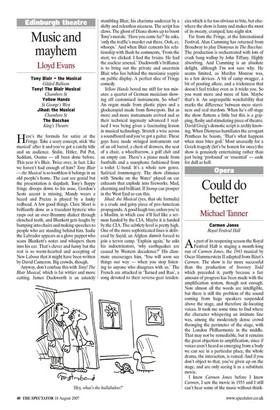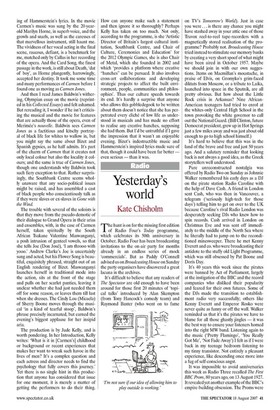Could do better
Michael Tanner Carmen Jones Royal Festival Hall s part of its reopening season the Royal Festival Hall is staging a month-long run of Carmen Jones, the 1943 musical by Oscar Hammerstein II adapted from Bizet's Carmen. The show is far more successful than the production of Sweeney Todd which preceded it, partly because a fair amount of progress has been made with the amplification system, though not enough. Now almost all the words are intelligible, but there is still the problem of the sound coming from huge speakers suspended above the stage, and therefore de-locating voices. It took me some time to find where the character whispering an intimate line was, among the moderately dense crowd thronging the perimeter of the stage, with the London Philharmonic in the middle. That may not be remediable, but it remains the great objection to amplification, since if voices aren't heard as emerging from a body we can see in a particular place, the whole drama, the interaction, is ruined. And if you don't object to that, you've given up on the stage, and are only seeing it as a substitute movie.
I knew Carmen Jones before I knew Carmen, I saw the movie in 1955 and I still can't hear some of the music without thinking of Hammerstein's lyrics. In the movie Carmen's music was sung by the 20-yearold Marilyn Horne, in superb voice, and the growls and snarls, as well as the caresses of that marvellous instrument, still haunt me. The vividness of her vocal acting in the final scene, raucous, defiant, is a benchmark for me, matched only by Callas in her recording of the opera. And the Card Song, the finest passage in the work, is still about Death, 'dal ol' boy', as Home plangently, harrowingly, accepted her destiny. It took me some time and many performances of Carmen before I found one as moving as Carmen Jones.
And then I read James Baldwin's withering, Olympian essay on the movie (reprinted in his Collected Essays) and felt ashamed. But rereading it, I wonder if he isn't criticising the musical and the movie for features that are actually those of the opera, even of Merimee's nouvelle. Baldwin sees Carmen Jones as a factitious and kitschy portrayal of black life for whites to wallow in, but you might say the same about Bizet and Spanish gypsies, as he half admits. It's part of the charm of Carmen that it creates not only local colour but also the locality it colours; and the same is true of Carmen Jones, though one understands why Baldwin took such fiery exception to that. Rather surprisingly, the Southbank Centre seems wholly unaware that any socio-political issues might be raised, and has assembled a cast of black people who conscientiously talk as if they were slaves or ex-slaves in Gone with the Wind.
The trouble with several of the soloists is that they move from the pseudo-demotic of their dialogue to Grand Opera in their arias and ensembles, with, in the case of Carmen herself, taken spiritedly by the South African Tsakane Valentine Maswanganyi, a posh intrusion of genteel vowels, so that she tells Joe (Don Jose), 'I am thr000 with y000.' Andrew Clarke's Joe is uncertainly sung and acted, but his Flower Song is beautiful, exquisitely phrased, straight out of an English rendering of Bizet. Maswanganyi launches herself in traditional mode into the action, sits at the front of the stage and pulls on her scarlet panties, leaving it unclear whether she had just needed them off for some reason, or leaves them till last when she dresses. The Cindy Lou (Micaela) of Sherry Boone moves through the musical 'in a kind of tearful stoop', Baldwin's phrase precisely incarnated, but earned the evening's biggest applause for her insipid aria.
The production is by Jude Kelly, and is worth pondering. In her Introduction, Kelly writes: 'What is it in [Carmen's] childhood or background or recent experiences that makes her want to wreak such havoc in the lives of men? It's a complex question and each actress and director needs to find the psychology that fully covers this journey.' Yet there is no single hint in this production that anyone has considered that issue for one moment, it is merely a matter of getting the performers to do their thing.
How can anyone make such a statement and then ignore it so thoroughly? Perhaps Kelly has taken on too much. Not only, according to the programme, is she 'Artistic Director of Britain's largest cultural institution, Southbank Centre, and Chair of Culture, Ceremonies and Education' for the 2012 Olympic Games, she is also Chair of Metal, which she founded in 2002 and which 'provides a platform where creative "hunches" can be pursued. It also involves cross-art collaborations and developing strategic projects to affect the built environment, people, communities and philosophies'. Thus our culture speeds towards its end. It's hardly a surprise that anyone who allows this gobbledegook to be written about them doesn't notice that she has perpetrated every cliché of low life as understood in musicals and has made no effort to realise any creative hunches, supposing she had them. But I'd be untruthful if I gave the impression that it wasn't an enjoyable evening. Bizet's indestructible music and Hammerstein's inspired lyrics made sure of that, though it could have been far better — even serious — than it was.













































 Previous page
Previous page